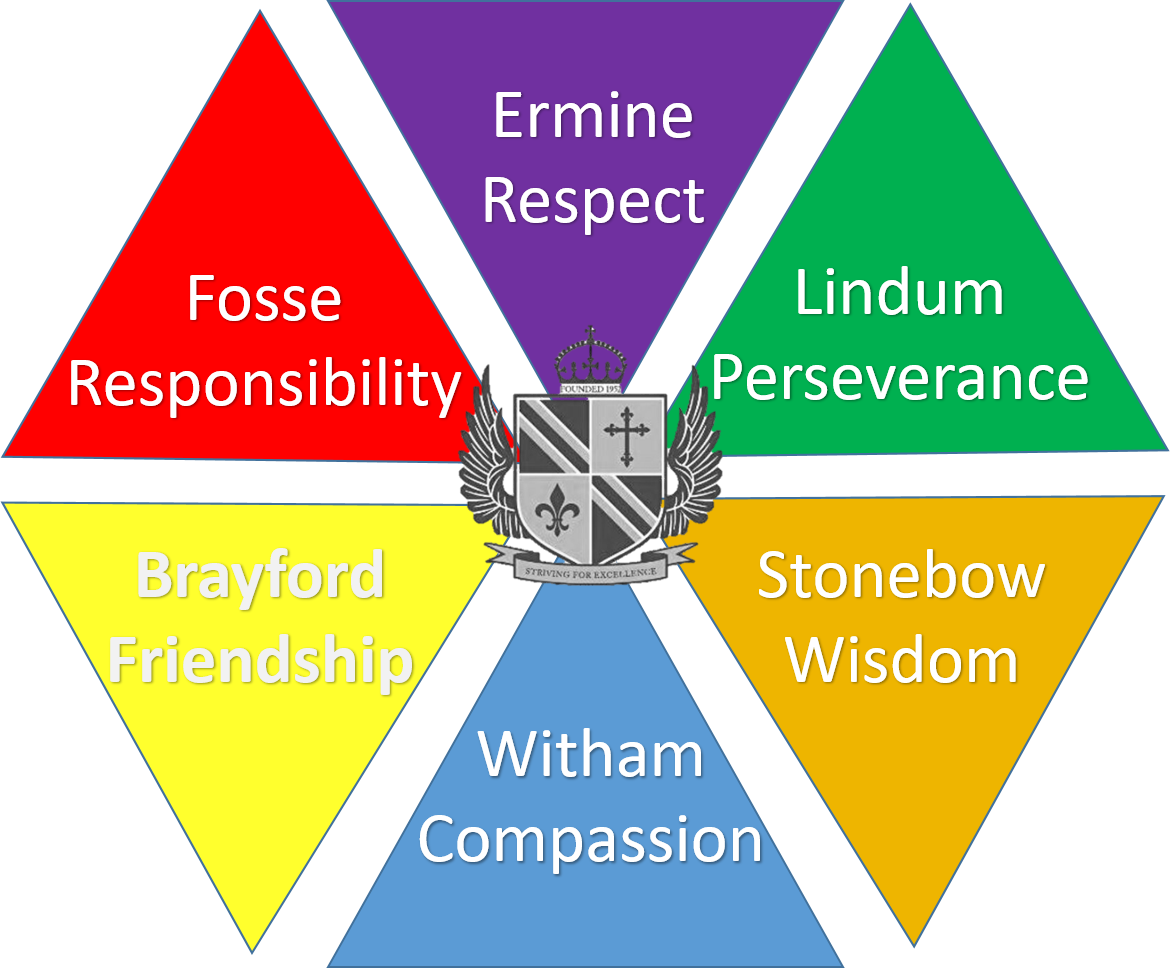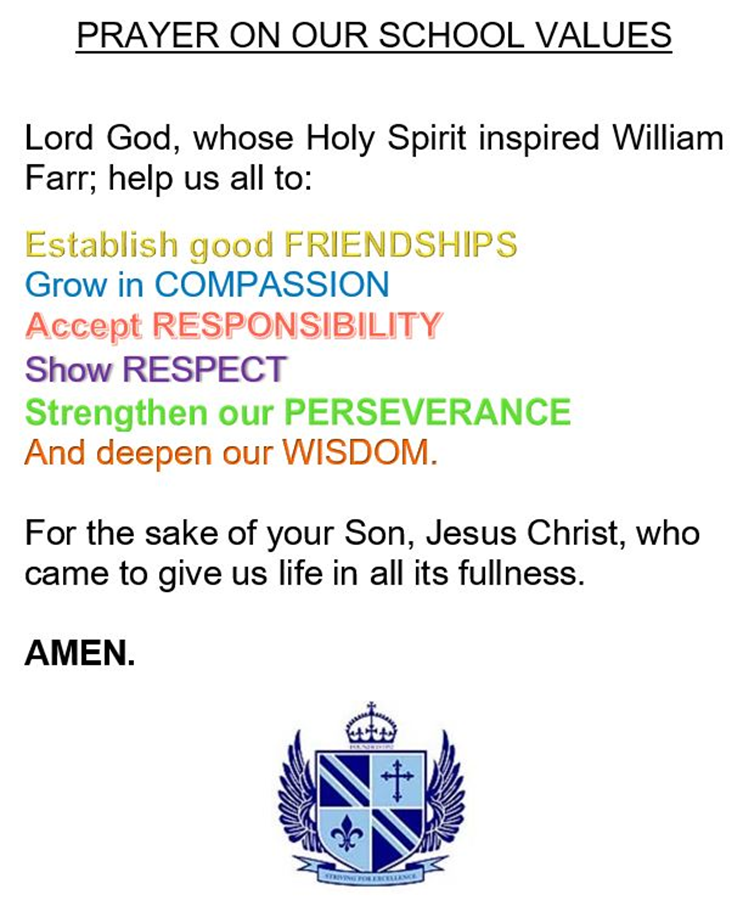Ethos, Values and Vision
At William Farr Church of England Comprehensive School, we are proud to be an inclusive and fully comprehensive school, catering for the needs of all of our students. Our students consistently make excellent progress in their studies and their behaviour is exemplary; not only do they respect one another, but they have respectful and excellent relationships with all of the staff.
Our school vision is to provide all members of the school community with the opportunities to engage with 'life in all its fullness' (John 10:10) through the highest quality of education, encouragement and endeavour. We are committed to striving for excellence and ensuring that all students are known, valued and can achieve.
Our vision is underpinned by our core values which are:
Compassion
Friendship
Perseverance
Respect
Responsibility
Wisdom

Our House system is a key feature of the school. Every student belongs to a house as do all members of staff. Houses compete in a variety of sporting and cultural competitions throughout the year and also gain points through the academic and social 'merit' systems. Each of our core values is associated with one of our Houses.
COMPASSION
(Show compassion to everyone - Exodus 33:19)
The root of the word ‘compassion’ is the idea of suffering alongside someone; it is about showing empathy, being able to understand what another person is going through and responding to their need. Throughout the Gospels, Jesus shows compassion for those in need, including the Samaritan woman (John 4:1-42), the paralysed man (Mark 2:1-12) and his friend, Lazarus (John 11:1-44). Christians believe that by becoming human in the person of Jesus Christ, God understands our suffering and is alongside us when we suffer. They believe God calls them to show compassion towards all those in need.
In our school community, we show compassion by caring for others and helping our peers.
FRIENDSHIP
(A Friend loves at all times - Proverbs 17:17)
Friendship is a highly valued element of human living in Christian thought. Christians seek to promote fulfilling, respectful and loving human relationships that reflect their understanding of a God who actively seeks relationship with human beings and is, in himself, a relational being (Father, Son and Holy Spirit). The Church of England understands itself to be a critical friend to the state, walking alongside the mechanisms of national life and not being afraid to speak truth to Government (Proverbs 27:6). Participation in Holy Communion, the sharing of bread and wine as members of the Christian community, enables Christians to understand themselves to be companions (literally, ‘one who shares bread’) to each other. Jesus, the friend of tax-collectors and sinners (Luke 7:34), emphasises the importance of friendship and models this friendship in his relationships with his companions (John 15:13-14).
In our school community, we share friendships as we walk with people through the good and hard times of life.
PERSEVERANCE
(We keep going even when it’s tough - Romans 5:4)
The story of the early Christian church is a story of perseverance in adversity. The disciples were convinced of the truth of Jesus’ death and resurrection and they felt called to share this good news with those around them. The book of Acts is full of stories of their persecution as they tried to express their beliefs about God, humanity and the world. In spite of this persecution, they didn’t give up, but remained committed to telling about the love of God. As St Paul puts it in his letter to the Romans, “…I am convinced that neither death nor life, neither angels nor demons, neither the present nor the future, nor any powers, neither height nor depth, nor anything else in all creation, will be able to separate us from the love of God that is in Christ Jesus our Lord” (Romans 8:38-39). For Christians, perseverance in faith and perseverance in living a Christian life are of key importance.
In our school community, we keep going and persevere to achieve our goals supported by staff and peers.
RESPECT
(We respect others’ views - Matthew 7:12)
Christians work towards a vision of the world as a place of peace, love and justice. In this vision, each person is offered respect in their uniqueness in the eyes of God. Respect means providing all people with what is right and fair for them: life, health, freedom, and dignity. The Bible is full of teachings about treating people respectfully (e.g. Exodus 23:2, 6). Paul, one of the founders of the early Christian church, writes in his letter to the Romans that they should “honour one another above yourselves” (Romans 12:10). Living respectfully is about creating a culture in which each person recognises that their own good is bound up with the good of others.
In our school community, we show respect to all.
WISDOM
(We make good use of what we have learnt
and we try to use wisdom to help others make the right choices - Proverbs1:7)
Although related to knowledge and understanding, wisdom is different from the accumulation and regurgitation of factual information. The Bible contains a genre of literature called wisdom literature (for example, the book of Proverbs). These texts provide Christians with an insight into the way life works; it helps them gain understanding of the consequences of our thoughts, words and actions, as well as offering an opportunity for them to explore the true value of things. Wisdom takes seriously the discernment we gain through life experience and the impact that sharing life experience can have on the growth and flourishing of others. It helps Christians distil the lessons learned from this experience into guiding principles for life.
The opposite of wisdom is foolishness. In the Gospel of Luke, Jesus tells a parable about a rich fool (Luke 12:13-21). In this story, the rich man is not criticised for his greed, but rather for placing his trust in the wrong things. Christians believe it is vital to place trust in God; they recognise the limitations of human beings and believe that there is more to life than we can see on the surface. By approaching life wisely, they seek to increase their understanding of the world and gain not simply knowledge, but powerful knowledge – knowledge that can transform.
In our school community, we aim to make wise choices, guided by examples we are shown by others and lead by example.
RESPONSIBILITY
(We are responsible for all our actions - Romans 14:12)
Being responsible means having the ability to respond. Throughout the Christian narrative, God builds relationships with human beings and gives them special responsibilities, from Moses in the Old Testament to Jesus’ disciples in the New Testament. Christians believe that all people have been created in the image of God (Genesis 1:26-27) and they see in Jesus’ journey to the cross an example of God walking alongside human beings (Colossians 3:12), speaking with them and offering them a chance to respond.
One way in which Christians live out this belief is by participating in the Eucharist, also known as Holy Communion, the Lord’s Supper or Mass. This is a shared meal, in which Christians and God are bound together, and in which all barriers are broken down and all people treated as equal. It offers an example of a world in which every person can flourish and in which humans live alongside each other in fellowship, each taking responsibility for the other.
In our school community, we take responsibility for our actions, our belongings and school property.

